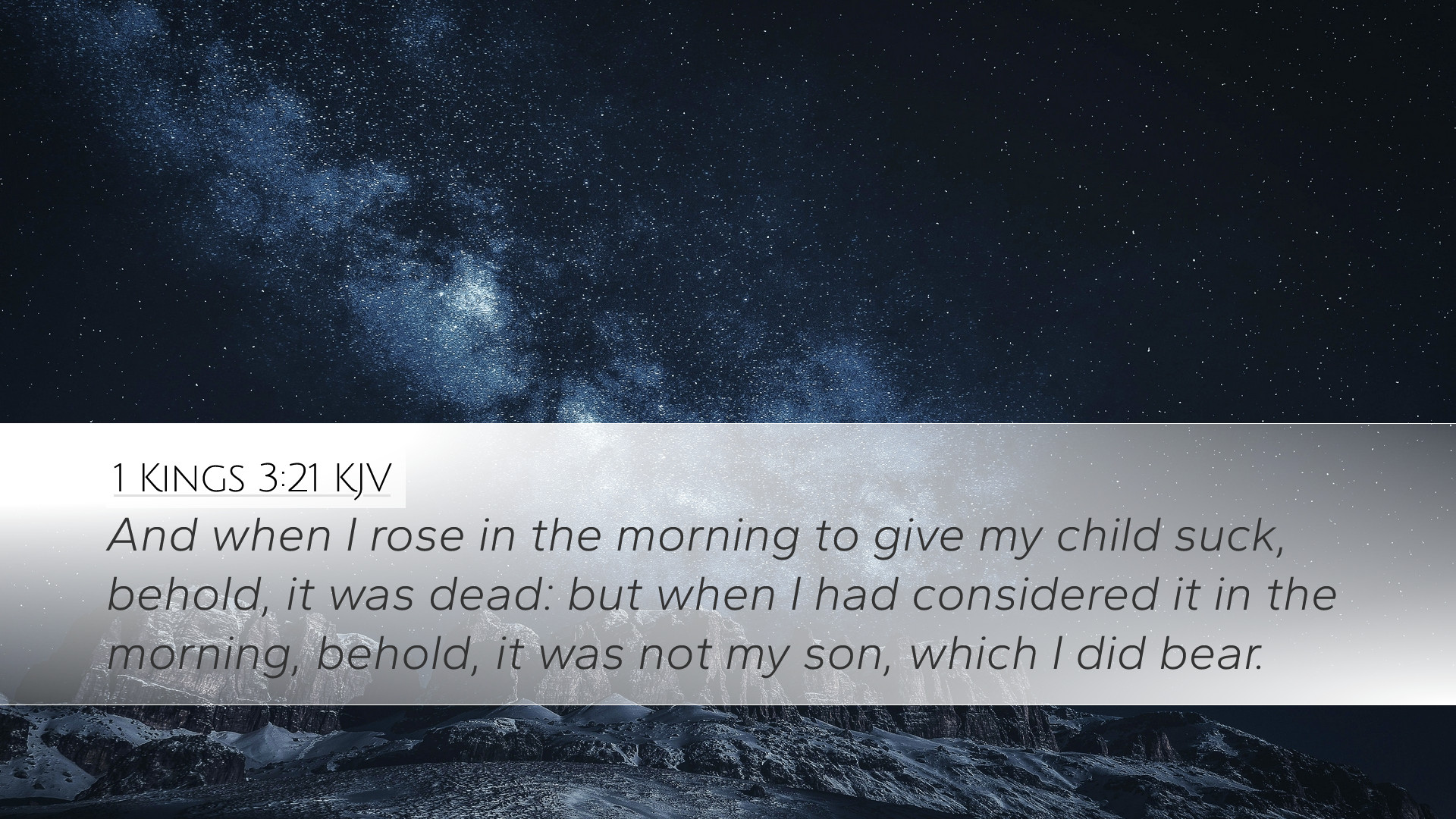Commentary on 1 Kings 3:21
Verse: "And when I had turned myself to the door, I had a vision of a man who stood before me and said, 'Take your sword, and pierce your heart, that you may not see my face'" (1 Kings 3:21).
Introduction
The passage in 1 Kings 3:21 unfolds within a broader narrative filled with divine wisdom, justice, and the consequences of human decisions. This verse specifically highlights the discerning nature of King Solomon, who exemplifies the wisdom granted by God. Various commentators have delved into this profound moment, offering insights that can enrich our understanding as we reflect upon the implications of wise leadership and the discernment of truth.
Overview of Context
To grasp the depth of this verse, it is essential first to recognize its setting within the scriptural narrative. This account takes place shortly after Solomon's elevation to the throne, where God appears to him in a dream and offers him anything he desires. Solomon, in a demonstration of humility and wisdom, asks for discernment to govern his people effectively. This request pleases God, who grants not only wisdom but also wealth and honor. The scenario in 1 Kings 3:21 arises when two women claim the same child, leading Solomon to devise a test to reveal the true mother.
Insights from Commentaries
Matthew Henry's Commentary
Matthew Henry emphasizes the profound wisdom Solomon exhibits throughout this chapter. He notes that Solomon's understanding is not merely intellectual but deeply relational, marked by a desire to seek justice and truth. When faced with the dilemma of the two mothers, Solomon’s directive to divide the child reveals his discerning character. Henry also observes that this act serves to expose the true nature of the mothers; the real mother would rather relinquish her child than see it harmed. This situational leadership displays Solomon's ability to perceive insights that transcend the immediate circumstances.
Albert Barnes' Notes on the Bible
Albert Barnes provides additional reflections on the implications of this verse. He highlights that the phrase "turning to the door" signifies an intentional movement towards a conclusion—an act of resolution and clarity. Barnes posits that Solomon’s wisdom is not just in deciding between the two women but rather in revealing the deeper emotional truth of motherhood. His approach—to test the motivations of each woman—demonstrates a profound understanding of human nature and emotional bonds. This layered analysis illustrates how leaders, specifically pastors and ministers, can glean wisdom from Solomon’s example in navigating complex interpersonal issues.
Adam Clarke's Commentary
Adam Clarke takes a slightly different angle, focusing on the nature of divine intuition as exemplified in Solomon's judgment. He contemplates the spiritual significance of Solomon's actions and how they reflect a deeper understanding of God's will in situations of conflict. Clarke notes that the miraculous aspect of Solomon's wisdom serves as a divine endorsement of his kingship. Moreover, he discusses the implications of wisdom in leadership, warning against the temptation of using one's authority for personal gain or favoritism, which was avoided by Solomon in this scenario.
Theological Reflection
This narrative challenges believers to reflect on the nature of wisdom and leadership. As pastors, students, and theologians engage with this passage, several themes emerge:
- Divine Wisdom: The necessity of seeking God’s wisdom in decision-making processes, particularly in complex and emotionally charged situations.
- Understanding Human Nature: The importance of discerning motivations and emotions in interpersonal relationships—recognizing that true wisdom goes beyond mere decision-making to an understanding of the heart.
- Justice vs. Compassion: The balance between enforcing justice and extending compassion, as Solomon displayed in his remarkable solution to the dispute.
- Spiritual Leadership: How leaders are called to reflect God’s character in their judgments, fostering trust and hope among those they lead.
Conclusion
The insights gathered from these commentaries underscore the transformative power of wisdom in leadership. Solomon’s encounter with the two mothers not only reveals his extraordinary judgment but also serves as a model for contemporary leaders. Reflecting on this passage invites clergy and scholars alike to seek divine guidance, emulate Christ-like discernment, and engage compassionately with the complexities of human nature. In a world rife with decisions requiring moral clarity, the legacy of Solomon's wise governance remains a beacon of hope and guidance for all leaders striving to uphold justice and truth.


